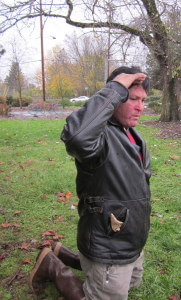-
Life Isn’t Free in Portland
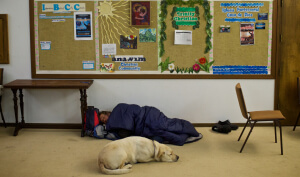 Life is free. Our mothers and fathers gave it to us, freely offering their joy and pain.
Life is free. Our mothers and fathers gave it to us, freely offering their joy and pain.Air is free. We breathe in and out our basic life sustaining force without a bill.
Love is free. If someone’s care and devotion is a tit-for-tat we might call it “desire” or “lust” but not love.
Water and sunlight are free. God freely pours down from the sky to all what we need to survive.
So, City of Portland, why do you say that unless we pay for sleep, we might be ticketed or even arrested? Why harass and criminalize the homeless because they are trying to sleep? Sleep is a natural process, one that all of us do without exception, so why punish us for it?
Without a night of sleep, our mind is slow, as if we were drunk.
Longer lack of sleep causes extreme sensitivity to stress and pain.
Lack of sleep causes mental instability.
A longer time without sleep leads to hallucinations.
To still be without sleep risks death.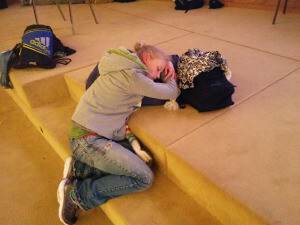 Well, perhaps sleep is a bad thing, but only in public, like sex or urination.
Well, perhaps sleep is a bad thing, but only in public, like sex or urination.
Because we know how disgusting it is to watch a baby sleep.
Or a child. I’m sure everyone is offended by watching a student fall asleep at a computer at a library. I don’t think anyone complains about a businessman, exhausted, fall asleep at a bus stop.No, what sweeps really are is a punishment of the poorest people in our city. It communicates how the city despises them, and are willing to treat people unjustly for doing what we all must do: sleep. They are being punished because they do not have a paid-for place to sleep in, as if they are destroying the rest of our livelihood, just by sleeping in public.
Charlie Hales, Police Chief O’Dea, City Council: This is your legacy to the future: injustice, preventing people from having that which they need to sustain their lives. Your prejudice against the poor will be the most important aspect of your policies, that which will be remembered for all time.
If you would like to call Mayor Charlie Hales to protest the ticketing and harassment of the homeless who are just trying to find a place to sleep, then call his voicemail line: 503-823-4120. If you’d like to send a message to the city council, send an email to Nick Fish: Nick@portlandoregon.gov
-
The Call
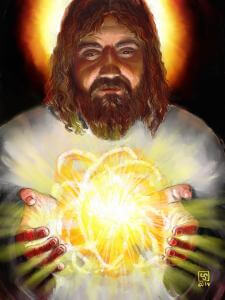 Jesus wants you.
Jesus wants you.He doesn’t want to simply own you, to retain you as a possession he would keep on a shelf. He wants to transform you to be a vessel for his love, love that you will pour out on others in need.
Will you listen to his call? He is not calling you to misery, but a life of joy-filled compassion and heroic sacrifice. He is asking you to step up and change the world, one powerful act of love at a time.
-
Shoes
Guest post by Dan MosleyMy first winter in Oregon on a Sunday, it was dark when I got up hurriedly to get dressed and ready for church. At last, late as usual, I reached under my bed and slipped my shoes on quickly, and was out the door with Martha. When we got there in the back row, there was a stranger sitting beside me who appeared to be hearing impaired. He sang loudly and off key. He smelled bad. His clothes threadbare. But, as he sat next to me, the oddest thing about him was his shoe. He wore worn out old brown loafers.When it was time to leave, we greeted each other. I could not help but glance awkwardly down. And that’s when the Lord dealt with me. You see, in the dark I had put on one of my old worn out shoes while I also put a new dress shoe on the other foot.Moral of the story: Be careful how you look down on other people. One day the shoe may be on the other foot. -
Nice Guys Finish Last
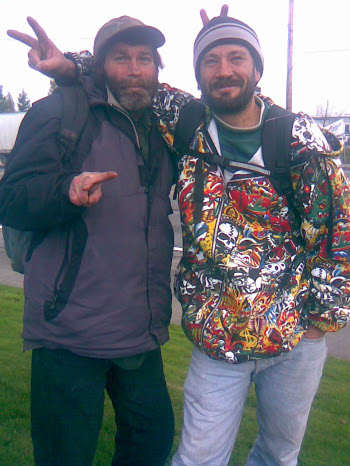 Based on a true story. Names have been changed.
Based on a true story. Names have been changed.
Tremaine was the nicest guy you’d ever meet. He was always gentle, always generous, always kind. No one could say a word against him. Occasionally he would sleep behind the courthouse, and when the police saw him there, they tried to move him on. The secretaries who worked in the courthouse would tell them to leave Tremaine alone, and the police would shrug and leave him alone.
There was, however, one man who had bad things to say about Tremaine. That was his drinking buddy, James, who was a nasty drunk. Pleasant when he was sober, but when he got drunk, he would become abusive. He would lay into Tremaine, who would say nothing, just sit and take it. He would talk about how Tremaine stole, how Tremaine beat people up, how Tremaine judged people, but it was never true. Tremaine just smiled and let James get worked up, never defending himself, until James got so angry that he would hit Tremaine, in vengeance of his many “wrongs”.
Over time, James realized that he had a serious problem, sobered up and got a job. But Tremaine stayed on the street.
He would stay behind the local church a few times a week, where the janitor would buy donuts every morning and give them to Tremaine and his friend Donny. Donny never left Tremaine’s side, because he was concerned about Tremaine’s horrifying blood pressure. At times Tremaine’s blood pressure got so high that he would collapse and had to be taken directly to the hospital. Donny would make sure he got to the hospital, and the doctors would save Tremaine’s life, as they did so many times. Then they would release Tremaine back to the street, where he would find Donny behind the church.
Eventually, Suzie, the janitor at the church, invited Tremaine and Donny to permanently stay behind the church. They didn’t have any formal permission from the church, but Suzie would make sure that no one gave them any trouble. She continued to get them donuts and coffee every morning, and asked them to do some clean up. The guys would be glad to do whatever they were asked, as long as their health allowed.
Donny was often in pain because of his hip. He had a replacement hip a decade ago, and it had worn out. However, his insurance wouldn’t allow him to get another replacement hip, so he often walked in pain, sometimes all night long, because he couldn’t rest on the concrete. But he and Tremaine had a good time behind the church, comfortable and safe.
They would often visit the local park, where many other homeless folks hung out, especially young people. Tremaine was known as “grandpa” because his large grey beard make him look older than he was. The high school homeless kids would hang out and drink and Tremaine would make sure that they didn’t come to harm. If the police came to harass them, Tremaine would always take the brunt of their anger, allowing the kids to leave.
Once a couple of the kids had nowhere to sleep, so they asked Tremaine where he stayed. Tremaine offered them a place to crash for the night. The kids slept next to Tremaine and Donny that night and the next. And some more kids came. And a couple more. Eventually, a group of kids set up a tent in front of the church, where they would use drugs, drink and have a party all night. Finally, the pastor of the church, took the situation in hand and told everyone they had to leave. The kids in the tent were so angry that they vandalized the church before they left.
Tremaine and Donny, having nowhere else to go, went to a local mall, and slept in the wind and rain. A local Christian man, who had known Tremaine a number of years, became concerned after his latest bout in the hospital. Frank asked him if he’d like to come live in his house. Tremaine couldn’t drink in the house, but he’d have a safe place to sleep and he could eat the food in the house. All he’d have to do is to work for Frank, helping his friends on the street one day a week.
Tremaine wasn’t sure. He had relied on alcohol for years to keep him sane and forgetful about his miserable life. He wasn’t sure he wanted to leave his friends whom he helped on the street, including Donny. Donny and the kids on the street begged Tremaine to take Frank up on his offer. Everyone was concerned that Tremaine wouldn’t be able to live long, given his terribly high blood pressure. No one wanted to see him die. But Tremaine wasn’t sure.
Tremaine remembered that he had quit drinking years ago. Just one day stopped, and didn’t touch it. He worked as a gas jockey then, and he didn’t make a good living, but he made a living. Then he lost his job, and then his apartment. He started to live on the street, and became unkempt. As he was sitting in the park with his friends, he looked over and saw his sister, playing with her kids. He smiled as he approached her, as they hadn’t seen each other for a couple years. She looked up, recognized him, didn’t say a word, but picked up her kids, took them to the car and drove away. After seeing her reaction to him, Tremaine turned around to his friend James, pointed at his 40-ouncer and said, “Give me that.” He drank the whole bottle. And the next one.
He realized that he had people who cared about him. Really cared. Donny. The kids. Suzie. Frank. They all wanted to see him live. He couldn’t care less. But he would live for them. Quitting drinking wasn’t so hard. And Frank said that he’d drive him to see his friends every week. So Tremaine agreed.
Living in a house is something to get used to, but it was comfortable. Tremaine could live his quiet, gentle life. His blood pressure eventually went down as his stress went down. He went out every week and worked in a church and saw his homeless friends. And eventually, Donny moved into the house as well. Life wasn’t so bad after all.
-
Basic Statistics About Homelessness
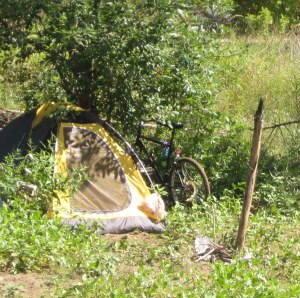 On a given winter night in 2013, the point in time survey found that there are 610,000 homeless people in the United States, sleeping on the street, vehicles or temporary shelters.
On a given winter night in 2013, the point in time survey found that there are 610,000 homeless people in the United States, sleeping on the street, vehicles or temporary shelters.Throughout any given year, there are approximately 3.5 million people who become homeless in the United States, which is about one percent of the total population.
About 2/3 of the homeless population are male, 1/3 female.
22 percent of the homeless are under 18.
About 25 percent of the homeless are families of three or more.
64 percent of the homeless are single individuals.
Homeless populations tend to rise in the summer.
41 percent of the homeless are black.
37 percent of the homeless are white.
10 percent of the homeless are Hispanic.
There are different kinds of homelessness:
Couch surfing (staying with friends or family)
In a shelter, temporarily (6 months or less)
Living in an RV or vehicle
Sleeping on the street/camping
Although there are different stresses in each of the kinds of homelessness, what they all have in common is the uncertainty of how long one might be able to stay in any given place. At any moment, in each of these situations, a person may be told to move out, with little or no notice.
Approximately 70 percent of all homeless people get off the street in two months or less.
Only about ten percent of all homeless folks are “chronically” homeless, for a year or more.
The length one is homeless is a serious issue. The stress of homelessness is akin to being in a home with an abusive person. One isn’t abused all the time, but the stress of the potential of abuse is always there. Even so, a homeless person may not be forced to move all the time, or to be attacked, or to be yelled at, but the stress of it is there always. Thus, just as there is a difference between someone who has lived in a home with an abused person for a month, as opposed to two years, so the same with the homeless. The longer one lives with the stresses of homelessness, the more likely someone is to have severe mental health issues, cognitive issues, addictions, chronic health problems and other issues related to stress.
Most important medical issues of the homeless:
PTSD– It is determined that up to 95 percent of all the homeless have experienced trauma.
Untreated dental issues
Untreated cuts or injuries
Chronic diseases
Respiratory illness
Hypothermia
Dehydration
A person is three times as likely to die on the street than in housing.
Statistics from: National Coilition for the Homeless; National Alliance to End Homelessness; the 2010 Annual Report on Homelessness to Congress; The 2013 Point in Time Homeless Count; The Homeless Hub; National Student Campaign against Homelessness and Hunger.
3733 N Williams Ave
Portland, OR 97227
503.888.4453
AnawimCC@gmail.com
Ministry Locations and Times »

